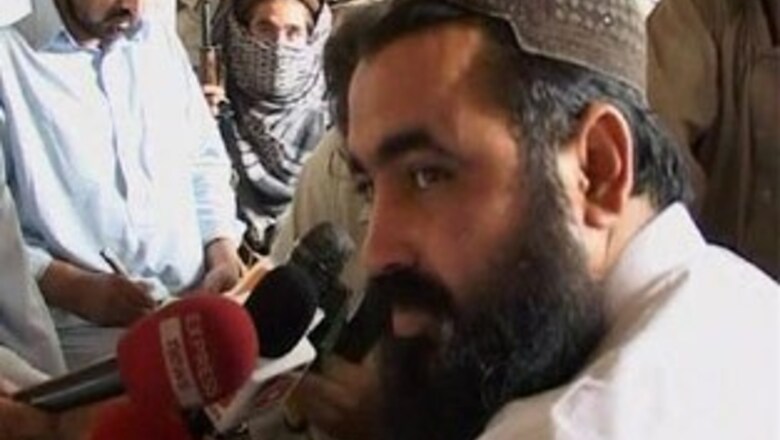
views
Washington: As President Barack Obama discusses the US strategy toward Pakistan with his top advisers on Wednesday, Pakistan's foreign minister appealed for market access, military technology -- and above all, trust.
Shah Mehmood Qureshi dismissed concerns that expanded US aid to Pakistan had too many strings attached, but said the country's wobbling economy needed more, in particular access for its goods to Western markets.
"The challenge we face is far larger than that," he told Reuters. "We are not asking for you to keep doling out money and aid, we are asking for greater market access."
"Better trade with the European Union and the US can help our economy stabilise."
Obama has said that increased aid and trade will be tools he plans to use to fight Islamic extremism both in Afghanistan and neighboring Pakistan.
Congress has just approved a bill tripling aid to Pakistan to $1.5 billion a year for the next five years, but with conditions attached that have unleashed a storm of protest from Pakistanis who complain the country is being humiliated.
A bill sought by Obama to boost trade by establishing special economic zones in Pakistan and Afghanistan has stalled in the US Senate, partly over concerns about labor standards as well as worries within the US textile industry.
Obama also turns to Pakistan on Tuesday as he holds the third in series of meetings to review his Afghanistan-Pakistan strategy.
High on the agenda will be how far to trust Pakistan's shadowy military intelligence agency, the ISI, widely accused of supporting radical Islamists including the Afghan Taliban.
Qureshi dismissed those charges and professed ignorance of the whereabouts of Afghan Taliban leader Mullah Omar, who Washington says is sheltering in the Pakistani city of Quetta.
The United States, he said, needed to have a little bit more faith in the immensely powerful ISI.
"If you keep doubting them, and don't expect them to cooperate with you, that's a contradiction," he said. "Either trust them or don't trust them. Don't have one step forward, two steps backward."
Pakistani protests prompt US Lawmaker retorts
But even as Qureshi spoke of the need for trust, an influential US lawmaker reacted angrily to Pakistani protests over conditions in the US bill tripling development aid to Pakistan.
Democratic Representative Gary Ackerman, who chairs the House of Representatives foreign affairs subcommittee on the Middle East and South Asia, responded after Pakistan's army said it had concerns about the aid bill and opposition politicians called it humiliating.
"If the people of Pakistan really don't want our assistance ... if, after so much effort and sacrifice by our two countries working together, they still don't even believe that we wish them well -- and, worse, are prepared to say so only days after the United States Congress made an unprecedented commitment of long-term assistance, then I suppose we need to face the truth sooner than later," Ackerman said in a statement.
He said Islamabad should be aware that US military aid is "not reserved for them and that American interests in South Asia are not limited to just Pakistan. We don't sell F-16s and Harpoon missiles to just anyone."
The US bill does not place conditions on the development aid, but stipulates that military aid will cease if Pakistan does not help fight "terrorists," including Taliban and al Qaeda members taking sanctuary on the Afghan border. It also seeks Pakistani help to dismantle nuclear supplier networks.
Transfer Drone-technology to Pakistan
As Obama mulls whether to send more troops to Afghanistan, he is also considering other ideas, like stepped-up bombing attacks on Taliban and al Qaeda targets in Pakistan.
Raids by unmanned "drone" aircraft are credited with killing Pakistani Taliban leader Baitullah Mehsud in August, although they have yet to net any major al Qaeda leaders.
They have also killed scores of civilians and angered many Pakistanis who feel their sovereignty has been trampled upon, leading critics to argue the policy is counterproductive.
"You have to understand our sensitivities," Qureshi said in the interview with Reuters. "The way out that we have suggested is the use of drones, but under our ownership. Transfer technology to Pakistan and then let us use them."
Such an idea would provoke howls of protest from neighbor and arch-rival India, and would surely meet significant opposition in the US Congress.
Nevertheless Qureshi said the Obama administration was considering the issue. "Their mind is not shut to the arguments that we have projected," he said. "We have a common objective. You have to see the gains you make by going ahead and engaging with us on this issue."
Qureshi said the Pakistani army would "most certainly" carry out a long-overdue military campaign against militants sheltering in the rugged Waziristan region on the Afghan border, once it had marshaled the necessary resources.

















Comments
0 comment